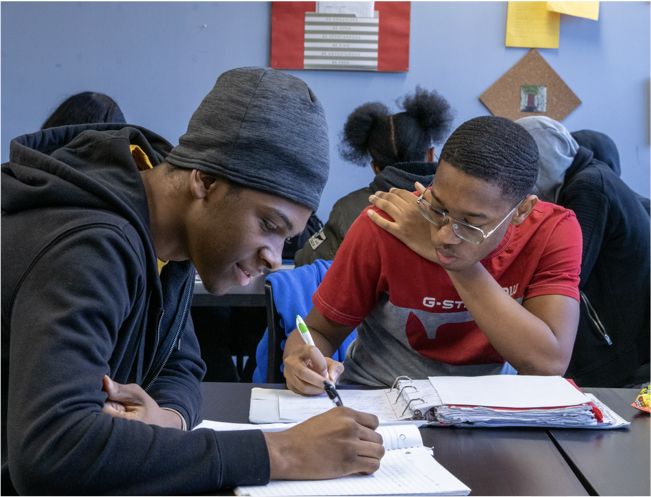Bard Baltimore’s academic objective is to provide an intellectually challenging and inspiring academic program for students and enable them to take a full-time college course of study in place of the 11th and 12th grades, free of charge. The Bard High School Early College program provides a seamless transition for students from middle school to high school to college and results in college readiness and the opportunity for students to complete 60 transferable college credits and an associate in arts degree from Bard College, while simultaneously fulfilling the requirements of Baltimore City Public Schools and the State of Maryland for the high school diploma.

Our students gain:
In the high school program (9th and 10th grades) in our four-year early college high school campuses, a more structured, high school curriculum in the 9th and 10th grades helps students ease into college coursework. High school classes are taught by the same college faculty that teach in the college program, and classwork incorporates similar critical reading, writing, and thinking techniques. Alongside a robust network of academic support resources, the high school classes help students more adequately prepare for the demands of their rigorous college classes in the last two years.
In the college program – in ”Year One and Year Two,” in place of the 11th and 12th grades – students take a full-time college course of study in the liberal arts and sciences. All classes are taught by college faculty who are active and accomplished in their fields and meet the standards of Bard College. Classes are inquiry- and discussion-based, encouraging active engagement with professors and peers. All students in the college program take a two-year interdisciplinary seminar sequence, one class per semester. Through critical reading and interpretation, students engage with seminal texts from antiquity to modernity across the humanities.
In order to receive the Bard associate of arts Degree, students must earn 60 college credits with a cumulative GPA of at least 2.0 during the two years in the college program; they must also fulfill the following distribution requirements and complete all high school diploma requirements:
A core component of our academic model is Bard Writing and Thinking pedagogy, designed by the Bard Institute for Writing and Thinking. Every fall semester at Bard Early College begins with The Writing & Thinking Workshop, a multi-day intensive learning experience that provides students in every grade level with interesting exercises in critical reading and writing upon which they can build in their regular courses. Based on the principle that strong writing and close reading enrich and enliven the classroom experience in all disciplines, the workshop sets the stage for the kind of interdisciplinary, intensive, writing work students will engage with during their time at Bard Baltimore.
Faculty members across disciplines include W&T in their classrooms, using short writing and critical reading exercises, including “focused free writes,” “believing and doubting,” and “text explosions,” and accompanying group discussions about the texts at hand to facilitate dialogue and as a tool for reflection, skill assessment, and continued development. Most importantly, Writing and Thinking pedagogy helps students learn how to use writing as a powerful tool for developing their thinking and voice.
The Seminar Sequence is the signature humanities experience of the Bard Early College program. The four-semester interdisciplinary Seminar Sequence exposes students to major thematic conversations around texts from antiquity to modernity, which students engage in through critical reading, interpretation, writing, and discussion. Major texts include Baldwin’s The Fire Next Time, Sophocles and Doerries’ Antigone in Ferguson, Sappho’s lyric poetry, Plato’s Symposium, Homer’s Odyssey, Walcott’s Omeros, Dante’s Inferno, Ellison’s Invisible Man, Shelley’s Frankenstein, Marx and Engels’ The Communist Manifesto, Freud’s Civilization and Its Discontents, du Bois’ The Souls of Black Folk, Woolf’s To the Lighthouse, Morrison’s Sula, Rhys’ Wide Sargasso Sea, and Foucault’s Discipline and Punish, among other, shorter works. The Seminar Sequence is modeled on Bard College’s signature humanities course, First-Year Seminar.
Faculty members across disciplines include W&T in their classrooms, using short writing and critical reading exercises, including “focused free writes,” “text explosions” “believing and doubting” exercises, and accompanying group discussions about the texts at hand to facilitate dialogue and as a tool for reflection, skill assessment, and continued development. Most importantly, Writing and Thinking pedagogy helps students learn how to use writing as a powerful tool for developing their thinking and voice.
The Seminar Sequence is the signature humanities experience of the Bard Early College program. The four-semester interdisciplinary Seminar Sequence exposes students to seminal texts from antiquity to modernity, which students engage through critical reading and interpretation. Readings include Homer’s Iliad, Plato’s Republic, Dante’s Inferno, Machiavelli’s The Prince, Shakespeare’s Hamlet, Darwin’s The Origin of Species, Marx’s The Communist Manifesto, Freud’s Civilization and Its Discontents, Du Bois’ The Souls of Black Folk, Woolf’s To the Lighthouse, Kafka’s The Trial, and Coates’ Between the World and Me, among others. The Seminar Sequence is modeled on Bard College’s signature humanities course, First-Year Seminar.
Grade 9: Literature of the Americas, History of the Americas, Algebra I or Geometry, Survey of Music, American Government, Spanish I, Chinese I, Physics, Drawing and Painting
Grade 10: Literature of the World, World History, Geometry, Chemistry, Foundations of Technology, Fine Arts I or Drawing into Design or Mixed Media, Physical Education, Health, Spanish II or Chinese II
Year 1: Year 1 Seminar, Literature/Humanities Electives, College Algebra, College Biology, College Spanish I or College Chinese I, Arts Elective, College Research Workshop
Year 2: Year 2 Seminar, Literature/Humanities Electives, Probability and Statistics, College Chemistry or Physics, College Spanish II or College Chinese II, Arts Electives, College Research Workshop
Literature/Humanities Electives for Year 1 and Year 2 students include: African-American History, American Cities, Literature of the City, Creative Writing, Economics, Introduction to Public Policy, Historical Fiction, The Election
Arts Electives for Year 1 and Year 2 students include: Issues in Contemporary Art, Art of Anatomy, College Music, Graphic Design
EXPLORE OUR SYLLABI: